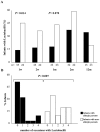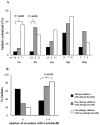Early colonization with a group of Lactobacilli decreases the risk for allergy at five years of age despite allergic heredity - PubMed (original) (raw)
Early colonization with a group of Lactobacilli decreases the risk for allergy at five years of age despite allergic heredity
Maria A Johansson et al. PLoS One. 2011.
Abstract
Background: Microbial deprivation early in life can potentially influence immune mediated disease development such as allergy. The aims of this study were to investigate the influence of parental allergy on the infant gut colonization and associations between infant gut microbiota and allergic disease at five years of age.
Methods and findings: Fecal samples were collected from 58 infants, with allergic or non-allergic parents respectively, at one and two weeks as well as at one, two and twelve months of life. DNA was extracted from the fecal samples and Real time PCR, using species-specific primers, was used for detection of Bifidobacterium (B.) adolescentis, B. breve, B. bifidum, Clostridium (C.) difficile, a group of Lactobacilli (Lactobacillus (L.) casei, L. paracasei and L. rhamnosus) as well as Staphylococcus (S.) aureus. Infants with non-allergic parents were more frequently colonized by Lactobacilli compared to infants with allergic parents (p = 0.014). However, non-allergic five-year olds acquired Lactobacilli more frequently during their first weeks of life, than their allergic counterparts, irrespectively of parental allergy (p = 0.009, p = 0.028). Further the non-allergic children were colonized with Lactobacilli on more occasions during the first two months of life (p = 0.038). Also, significantly more non-allergic children were colonized with B. bifidum at one week of age than the children allergic at five years (p = 0.048).
Conclusion: In this study we show that heredity for allergy has an impact on the gut microbiota in infants but also that early Lactobacilli (L. casei, L. paracasei, L. rhamnosus) colonization seems to decrease the risk for allergy at five years of age despite allergic heredity.
Conflict of interest statement
Competing Interests: The authors have declared that no competing interests exist.
Figures
Figure 1. Intestinal colonization with Lactobacilli in infants with allergic and non-allergic parents respectively.
The y-axis shows percentage infants colonized at the different time points (A) and percentage infants colonized 0, 1, 2, 3 or 4 occasions the first two months of life in (B).
Figure 2. Early life gut microbiota composition associates with allergic disease at age five.
The y-axis shows the percentage, colonized with (A) Lactobacilli, (B) B. bifidum, (C) B. breve, (D) B. adolescentis and (E) S. aureus. Solid line; non-allergic children n = 16–19. Dashed line; allergic children n = 18–20 (1 v–2 m), n = 9 (12 m).
Figure 3. Colonization with Lactobacilli the first year of life, sub grouped according to both parental allergy and allergy at five years of age.
Proportion of infants, in percentage, the different time points investigated in (A). Percentage infants colonized 0 or 1–4 occasions the first two months of life in (B).
Similar articles
- Altered early infant gut microbiota in children developing allergy up to 5 years of age.
Sjögren YM, Jenmalm MC, Böttcher MF, Björkstén B, Sverremark-Ekström E. Sjögren YM, et al. Clin Exp Allergy. 2009 Apr;39(4):518-26. doi: 10.1111/j.1365-2222.2008.03156.x. Epub 2009 Feb 9. Clin Exp Allergy. 2009. PMID: 19220322 - Early-life gut bacteria associate with IL-4-, IL-10- and IFN-γ production at two years of age.
Johansson MA, Saghafian-Hedengren S, Haileselassie Y, Roos S, Troye-Blomberg M, Nilsson C, Sverremark-Ekström E. Johansson MA, et al. PLoS One. 2012;7(11):e49315. doi: 10.1371/journal.pone.0049315. Epub 2012 Nov 20. PLoS One. 2012. PMID: 23185315 Free PMC article. - Childhood allergy is preceded by an absence of gut lactobacilli species and higher levels of atopy-related plasma chemokines.
Björkander S, Carvalho-Queiroz C, Hallberg J, Persson JO, Johansson MA, Nussbaum B, Jenmalm MC, Nilsson C, Sverremark-Ekström E. Björkander S, et al. Clin Exp Immunol. 2020 Dec;202(3):288-299. doi: 10.1111/cei.13494. Epub 2020 Aug 5. Clin Exp Immunol. 2020. PMID: 32652542 Free PMC article. Clinical Trial. - Prevention of allergic disease in childhood: clinical and epidemiological aspects of primary and secondary allergy prevention.
Halken S. Halken S. Pediatr Allergy Immunol. 2004 Jun;15 Suppl 16:4-5, 9-32. doi: 10.1111/j.1399-3038.2004.0148b.x. Pediatr Allergy Immunol. 2004. PMID: 15125698 Review. - The role of gut microbiota in the pathogenesis and management of allergic diseases.
Compare D, Nardone G. Compare D, et al. Eur Rev Med Pharmacol Sci. 2013;17 Suppl 2:11-7. Eur Rev Med Pharmacol Sci. 2013. PMID: 24443062 Retracted. Review.
Cited by
- The Role of Biodiversity in the Development of Asthma and Allergic Sensitization: A State-of-the-Science Review.
Paciência I, Sharma N, Hugg TT, Rantala AK, Heibati B, Al-Delaimy WK, Jaakkola MS, Jaakkola JJK. Paciência I, et al. Environ Health Perspect. 2024 Jun;132(6):66001. doi: 10.1289/EHP13948. Epub 2024 Jun 27. Environ Health Perspect. 2024. PMID: 38935403 Free PMC article. Review. - Epigenetics and Malaria Susceptibility/Protection: A Missing Piece of the Puzzle.
Arama C, Quin JE, Kouriba B, Östlund Farrants AK, Troye-Blomberg M, Doumbo OK. Arama C, et al. Front Immunol. 2018 Aug 3;9:1733. doi: 10.3389/fimmu.2018.01733. eCollection 2018. Front Immunol. 2018. PMID: 30158923 Free PMC article. Review. - Birth Mode, Breastfeeding, Pet Exposure, and Antibiotic Use: Associations With the Gut Microbiome and Sensitization in Children.
Kim H, Sitarik AR, Woodcroft K, Johnson CC, Zoratti E. Kim H, et al. Curr Allergy Asthma Rep. 2019 Mar 11;19(4):22. doi: 10.1007/s11882-019-0851-9. Curr Allergy Asthma Rep. 2019. PMID: 30859338 Free PMC article. Review. - Development of Gut Microbiota in a Mouse Model of Ovalbumin-induced Allergic Diarrhea under Sub-barrier System.
Wang JH, Fan SW, Zhu WY. Wang JH, et al. Asian-Australas J Anim Sci. 2013 Apr;26(4):545-51. doi: 10.5713/ajas.2012.12502. Asian-Australas J Anim Sci. 2013. PMID: 25049821 Free PMC article. - Gut Microbiome and Serum Metabolome Analyses Identify Unsaturated Fatty Acids and Butanoate Metabolism Induced by Gut Microbiota in Patients With Chronic Spontaneous Urticaria.
Wang D, Guo S, He H, Gong L, Cui H. Wang D, et al. Front Cell Infect Microbiol. 2020 Feb 21;10:24. doi: 10.3389/fcimb.2020.00024. eCollection 2020. Front Cell Infect Microbiol. 2020. PMID: 32154184 Free PMC article.
References
- Adlerberth I, Wold AE. Establishment of the gut microbiota in western infants. Acta Paediatr. 2009;98(2):229–238. - PubMed
- Grönlund MM, Lehtonen OP, Eerola E, Kero P. Fecal microflora in healthy infants born by different methods of delivery: Permanent changes in intestinal flora after cesarean delivery. J Pediatr Gastroenterol Nutr. 1999;28(1):19–25. - PubMed
- Sjögren YM, Jenmalm MC, Böttcher MF, Björkstén B, Sverremark-Ekström E. Altered early infant gut microbiota in children developing allergy up to 5 years of age. Clin Exp Allergy. 2009;39(4):518–526. - PubMed
- Fink LN, Zeuthen LH, Christensen HR, Morandi B, Frokiaer H, et al. Distinct gut-derived lactic acid bacteria elicit divergent dendritic cell-mediated NK cell responses. Int Immunol. 2007;19(12):1319–1327. - PubMed
Publication types
MeSH terms
LinkOut - more resources
Full Text Sources
Medical


